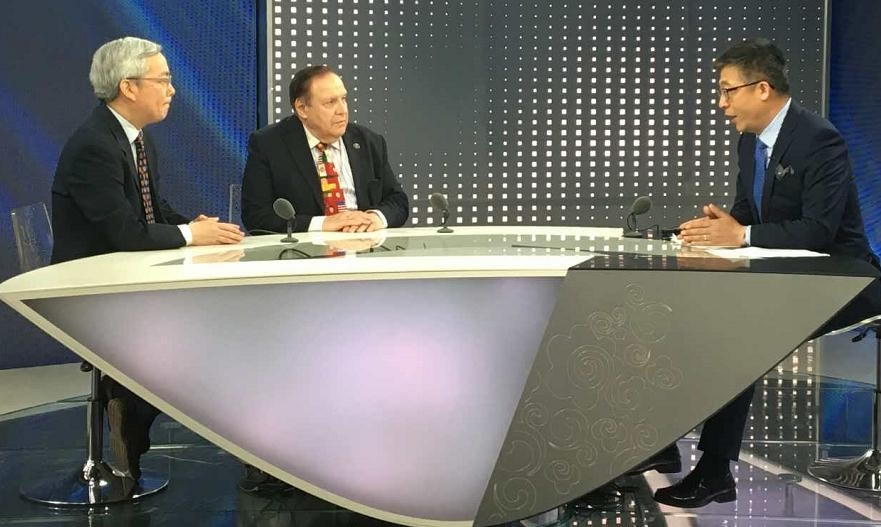By CGTN's Wang Hui
The 30th ASEAN Summit is currently being held in Manila, the capital of the Philippines. Arbitration rules, enhancing security, and multilateral communication on co-development are all being discussed.
The agenda of the high-level meeting held on April 29, included seeking out ASEAN’s role in the world and its path forward. How will ASEAN face future challenges? How can ASEAN cooperate with China under the Belt and Road Initiative? CGTN takes a closer look at ASEAN’s 50-year history and its 25 years of cooperation with China.
"Recently waters in the South China Sea seem pretty quiet, so does this mean that ASEAN member countries have reached a consensus as to their relationship with the PRC on this issue?" asked CGTN's Yang Rui.

Yang Rui (R), host of "Dialogue with Yang Rui," talks with two experts, Rong Ying (L) and Harvey Dzodin (C). /CGTN Photo
CGTN Video
Harvey Dzodin, a columnist at China Daily, answered, “If you think back a year ago it was a completely different picture before the ruling or award given by the Arbitration Tribunal. But it seems like a lot has happened since then. I don’t think it is because of ASEAN.”
He added, “ASEAN is quite a weak institution, but in my view a necessary one. Why is it weak? Because they have ruling and decision making by consensus, they call it the ‘ASEAN way’. It’s very slow and cumbersome. And they don’t have a lot of support in their central administration.” Another difficulty for the community is finding common ground among members, as disparity continues to exist.
Reviewing ASEAN’s 50 years of development, Rong Ying, Vice President of the China Institute of International Studies, agreed, saying, “I think that consensus building is always difficult for diverse regions and its culture in such multilateral situations.”
CGTN Video
Now, with the DPRK threatening the region with its nuclear ambitions, the challenge remains an obstacle for many parties involved both regionally and beyond northeast Asia. “Do you think China will firmly be behind ASEAN in protesting the nuclear test in the region?” Yang Rui asked.
“Certainly. Because as far as China’s policy goes, we have opposed nuclearization. Why has China supported ASEAN? I guess politically China has always shared a kind of sentiment or solidarity with developing countries,” said Rong.
“Also, I think it’s diplomatically a mean or platform where China can deal with ASEAN as the whole besides bilateral relations,” said Rong. “Thirdly, I guess it’s new development, as China grows and the competition or the perceived competition between China and the US intensifies, China strongly feels that ASEAN can also play a role in helping manage competition. That’s why we support the centrality of ASEAN, we support the regional institutions that ASEAN centered and initiated. In the meantime, China puts forward the idea that we hope ASEAN will continue to play a role that helps."
In May, ASEAN foreign ministers will visit the US to meet with Secretary of State Rex Tillerson on the South China Sea issue. What ASEAN's stance on the issue is remains ambivalent, with many keeping a close and watchful eye.
2841km










